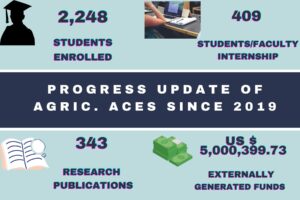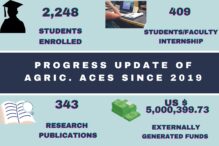Strengthening Agricultural Research and Partnerships through ACE Impact Project
Strengthening Agricultural Research and Partnerships through ACE Impact Project
Agriculture and its importance to Africa
Considered to be the backbone of economic systems of developing countries, agriculture is the mainstay of several African economies, underpinning their food security, export earnings, rural development, and economic stability. Given the enormous importance of Agriculture to Africa’s economic development, the ACE Impact project prioritizes agriculture and has it as one of the five broad thematic areas being supported by the project.
According to a report by the World Food and Agriculture Organization (FAO) 2020, agriculture’s contribution to GDP in Africa is at an average of 35%. Additionally, Africa achieved the highest rate of growth in agricultural production value (crops and livestock), the highest in the world, expanding by 4.3% per year between 2000 and 2018. This figure is roughly double that of the prior three decades (AGRA, 2020). Again, across Sub-Saharan Africa, the agricultural sector employs a proportion of the labor force and supplies the bulk of basic food, as well as provides subsistence and other income to a fraction of the population. It is noted that significant progress in promoting economic growth, reducing poverty, and enhancing food security cannot be achieved in most developing countries without enhancing the potential human and productive capacity of the agricultural sector and enhancing its contribution to overall economic and social development. A strong and vibrant food and agricultural system thus forms a primary pillar in the strategy of overall economic growth and development.
Extensive research continues to be conducted, examining ways of enhancing the agricultural sector as a means of improving its socio-economic benefits. In line with this, current trends in agricultural research have focused on plant breeding, food security and technology, agribusiness, genetically modified organisms (GMOs), animal science, among others.
The African Union’s New Partnership for Africa’s Development (NEPAD) posits that the Agric sector offers the greatest potential for poverty and inequality reduction, as it provides sources of productivity from which the most disadvantaged people working in the sector should benefit. As a result, national and private investments are being directed toward the development of agriculture within the region.
ACE Impact Contributions to Agriculture
The project has seven Agric-oriented centers in six countries (Cote d’Ivoire, Ghana, Niger, Nigeria, Senegal and Togo) focusing on areas including Food Security and Nutrition, Livestock and Poultry Science, Food Technology and Research, Dryland Agriculture, Crop Improvement, Climate Change/ Biodiversity, and Agricultural Entrepreneurship and Innovation. Click here to see ACE Impact agriculture centres:
Food Technology and Research(CEFTER); Regional Center of Excellence on Poultry Sciences (CERSA); African Center of Excellence in Agriculture for Food and Nutrition Security (CEA-AGRISAN) based at Cheikh Anta Diop University; West African Crop Improvement Center of Excellence (WACCI), Legon University, Ghana; – The Centre of Excellence Centre for Dryland Agriculture (CDA) at the University of Bayero, Kano, Nigeria; African Centre of Excellence on Climate Change, Biodiversity and Sustainable Agriculture (CEA- CCBAD) of the University Félix Houphouët Boigny; ACE: Pastoral Productions: Meat, Milk, Leather and Skins, Université Abdou Moumouni.
Overall, the ACE Impact Agric focused centres have been undertaking impactful research (leading to the publication of 343 Research findings in high impact journals, and still counting), collaborating with international, regional and national institutions to innovate and to strengthen Agriculture’s contribution to their national and regional economies, among others. Below are some key achievements of the Agric ACEs:

Food for West Africa Network
In line with strengthening Inter-ACE collaborations, various thematic networks have been created under the ACE Impact Project. The Food for West Africa (FOOD4WA) is one of eight thematic networks established with the aim of advancing collaboration on cutting-edge research, to address food insecurity challenges within the region. The network’s objectives are:
- To establish a network between faculty and students from the participating ACEs
- Create a coordination of research on priority themes related to food security
- Communicate the results of research and innovation through conferences and symposia involving key actors in the agricultural sector
- Create a digital platform
The network is expected to involve agriculture stakeholders within the region to strengthen food security, improve quality in agricultural products, train to increase the number of skilled agricultural workers and researchers and to develop innovative agricultural techniques to improve agricultural yields.
